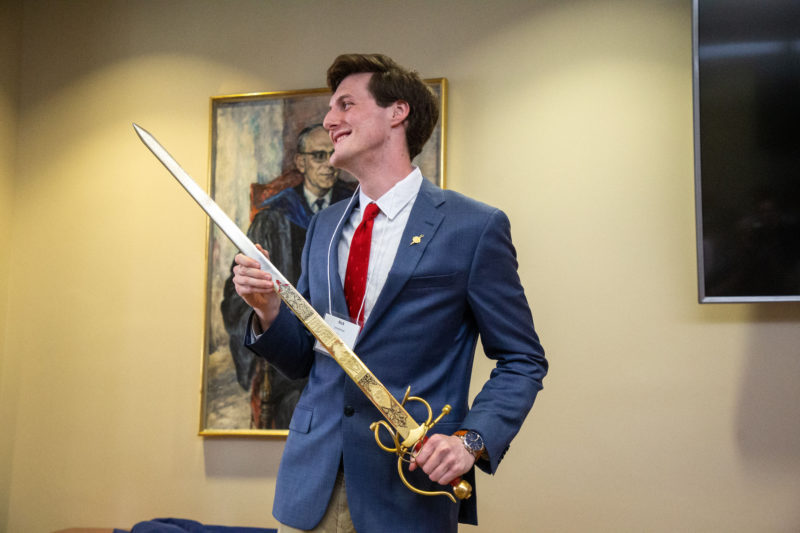
University of Lynchburg students took three awards at the 2023 Virginia Regional Phi Alpha Theta Conference, hosted by Lynchburg’s Department of History on Saturday, April 1.
Rick Smallshaw ’23 won second place in the world history category for his presentation, “Reading Red in ‘The Canterbury Tales’: Analyzing Several of Geoffrey Chaucer’s Descriptions and Symbolic Uses of Red Through a Historical Lens.”
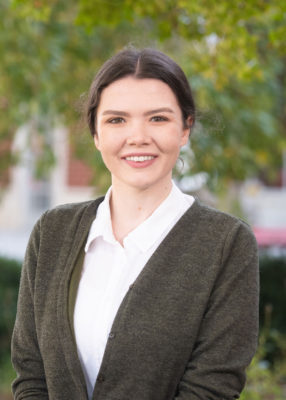
In the American history category, Winona Gear ’23 placed third for her project, “Reclaiming an Identity: The Impacts of the Racial Integrity Act of 1924 on the Identity Construction of Present-Day Monacan Indians in Amherst County, Virginia.”
Also in the American history category, Sam Lipert ’23 received an honorable mention for their presentation, “A Reform of Treatment: An Analysis of the American Asylum.”
Smallshaw said he became interested in his subject after taking the Westover Honors course Sickness and Wellness in the Canterbury Tales, taught by Dr. Elza Tiner.
“I’m principally a medieval historian and I’m also very interested in literature, so this project allowed me to synthesize two subjects I very much enjoy,” said Smallshaw, a history major with minors in medieval and Renaissance studies and German.
Lipert has long been interested in medicine, but after taking an AP psychology course in high school, their interest focused on “how mental health is viewed and treated.” A history major and Westover Honors Fellow, they carried that interest to Lynchburg.
“My freshman year here, I took … Historian’s Craft, for which you must write a paper on a topic of your choosing,” Lipert said. “I opted to indulge my curiosity and ended up writing a paper on how the scientific revolution and three prominent early physicians fundamentally changed how three mental illnesses and disorders were treated.”
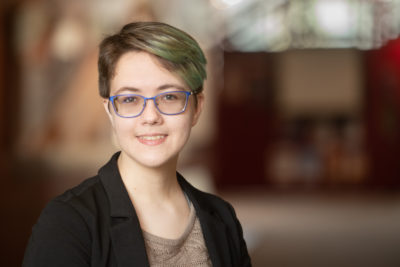
After writing another class paper about the country’s first asylum, Eastern State Hospital, Lipert decided to write their senior thesis on American asylums.
“[What] I’ve drawn from my research is that in spite of how horrific some asylums were, a surprising number of physicians put real effort into adopting patient-focused practices like those found in moral treatment, which placed the highest emphasis on kindness, understanding, and creating an environment in which one could heal,” Lipert said.
“One of the biggest pitfalls they fell victim to was that the asylums were significantly over capacity and they were under immense pressure to legitimize what they were doing as a field of medicine.
“From what I’ve seen, there was real potential in moral treatment, and in the asylum movement.”
More than 50 students, representing 12 different colleges and universities from four states, presented papers about their historical research at the conference. In addition to Lynchburg, institutions represented included the University of Richmond, Virginia Military Institute, Randolph College, Southern Virginia University, Virginia Wesleyan University, Liberty University, Hollins University, Radford University, Guilford College, Emory University, and Ohio Northern University.
Dr. Lisa Crutchfield, assistant professor of history and Phi Alpha Theta faculty advisor at Lynchburg, said the response to Lynchburg’s call for papers was “robust.”
She added, “We were honored to host the event and excited to bring together so many from across the state — and beyond! — to discuss their historical research. It was a fantastic group of enthusiastic attendees who fostered great conversations.
“I’m grateful for the entire Lynchburg team that helped make this event a success, especially the history students, as they did a stellar job in their overlapping roles of conference organizers, hosts, and presenters.”
During the daylong event, 11 Lynchburg students — most history majors or minors — gave 15- to 20-minute presentations on an array of historical subjects.
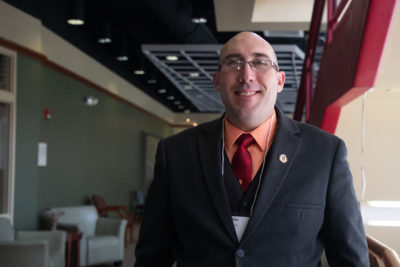
For his presentation, “Ghosting the Führer: How Deception Tactics Played a Vital Role Towards Victory in Europe,” Mike Muñoz ’25 researched the U.S. Army’s 23rd Headquarters Special Troops. The unit, also known as the “Ghost Army,” used deception to help defeat the Nazis during World War II.
“[They] used life-size inflatable tanks, vehicles, artillery guns, and even life-size inflatable airplanes,” Muñoz, a history major and U.S. Army veteran, said. “They conducted missions pretending to be another unit, wearing the other unit’s patches and vehicle markings, and moving in a completely different direction than the actual unit was going.
“They used radio chatter with false information, so the Nazis would hear the transmission and think the Americans were doing something completely different than they actually were. They would wear fake rank of high-ranking officers and speak loudly in public places of missions they were planning to conduct that were completely made up.
“They also created false documents to leak into the hands of the enemy. These missions resulted in fooling the Nazis just enough to limit the amount of casualties taken by Americans and Allied Forces on the Western Front.”
Muñoz added that he found the subject intriguing and thought it would even interest people who weren’t history scholars.
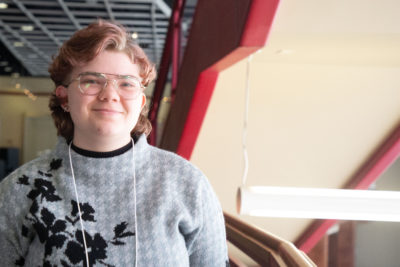
A longtime interest in the Salem, Massachusetts, witch trials of the 1690s led Michaela White ’25 to research witchcraft and women’s issues for her presentation, “Weaponized Religion: The Cry of ‘Witchcraft’ Used as a Method to Maintain Gender Roles in New England During Colonial America.”
The English and history major and Westover Honors Fellow said her goal was to use the research to “aid in correcting the discourse surrounding the witch trials, and expose yet another way in which women have been historically oppressed.”
A lecture about whether or not Robert E. Lee committed treason during the Civil War prompted Raymond Smith’s presentation, “The Determiner of Treason: A Case Study of Robert E. Lee and the Lost Indictment of 1865.”
“[The Civil War] was one of my favorite subjects in middle school and high school,” said Smith, a senior history and social studies education major at Lynchburg. “I was watching a lecture by Dr. Allen Guelzo from Princeton University, who spoke at Washington and Lee about Robert E. Lee and whether he committed treason or not.
“Though Guelzo was fascinating, I found that one area he didn’t address in his research was ‘Who determines treason?’ It was this idea … that led me to my research.”
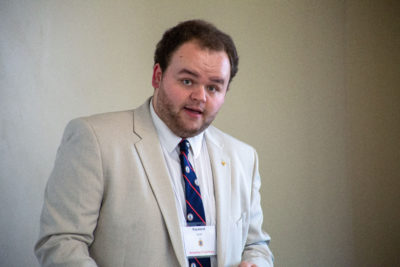
As Smith studied, he learned “how complicated treason is” and that “the requirements found within the Constitution are difficult to achieve and the amount of politics and personality that goes into the persecution and conviction of traitors is unimaginable.”
He also benefited in other ways. “This was quite an experience,” he said. “To pick your own topic and explore it as far as you desire is certainly a dream come true. It offers time to truly reflect on the lessons of the past and see where their influence remains present in the future.
“The only issue is that 25 pages fill up quickly!”
Students who wished to have their papers judged submitted them in advance of the conference for review by a panel of out-of-state professional historians. Winners — first, second, and third places — were recognized at the event and received their choice of a newly published hardback book from their field of study, courtesy of Phi Alpha Theta’s national office.
As described on the honor society’s website, Phi Alpha Theta is a “professional society whose purpose is to promote the study of history through the encouragement of research, good teaching, publication, and the exchange of learning and ideas among historians.
“It seeks to bring students, teachers, and writers of history together both intellectually and socially, and it encourages and assists historical research and publication by its members in a variety of ways.”
Lynchburg’s Alpha Beta Upsilon chapter of Phi Alpha Theta also hosted the conference in 2012.

